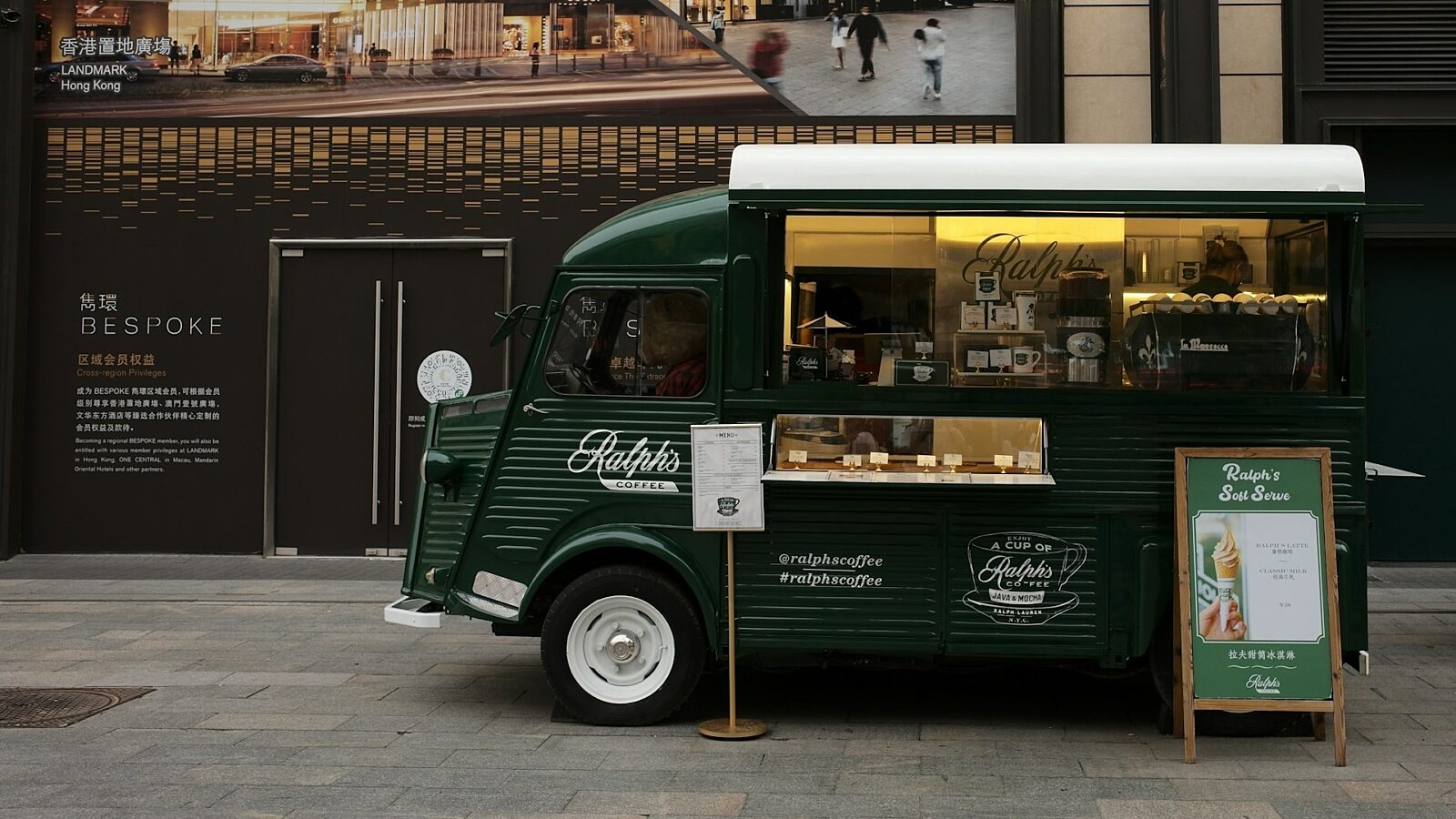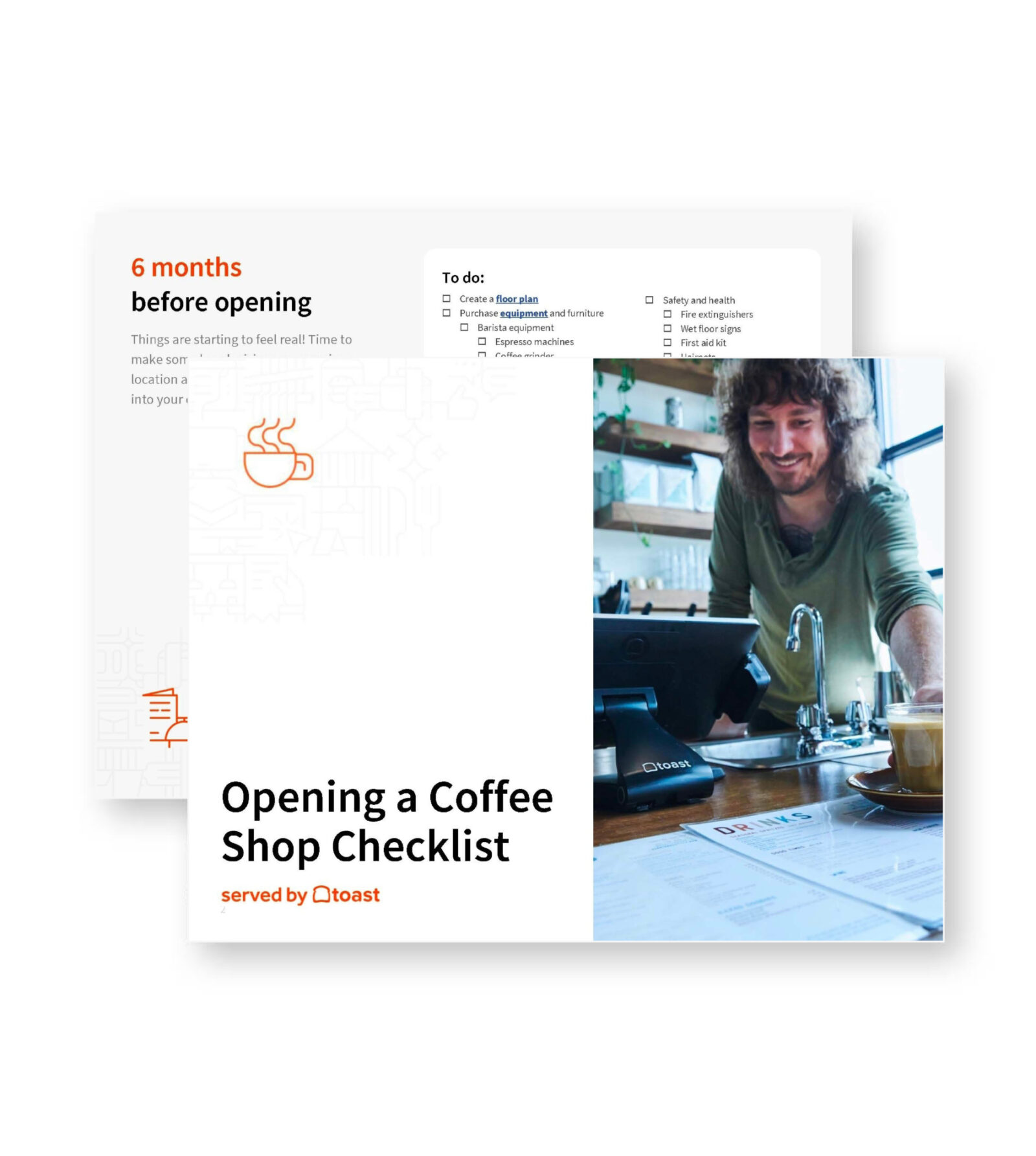
Coffee Truck Business Plan: How To Craft Your Roadmap [2024]
A coffee truck business plan is critical for launching your mobile coffee business. Learn how to craft a detailed coffee truck business proposal here.
Aidan ToborAuthor


Opening a Coffee Shop Checklist
So many things go into opening a coffee shop. With this free PDF checklist, you'll set your new business up for success.
Get free downloadStarting a coffee truck business can be a super profitable entrepreneurial venture. After all, coffee trucks often have lower overhead costs compared to other food service businesses, meaning there’s a better chance you’ll be profitable.
However, to be successful, it’s vital that you craft a detailed coffee truck business plan. Not only does this serve as a roadmap for your business, but it’s crucial for securing investments and loans.
In fact, Next Gen Personal Finance reports that having a business plan increases the chance of a startup launching by a staggering 260%.
So, in this article we’ll outline some of the key reasons you should develop a business plan for your coffee truck. We’ll also explore all of the elements that make up a good business plan, and close with some tips for presenting your proposal.
Key Takeaways
A coffee truck business plan is essential for ensuring you consider all the key aspects of running your business.
Your plan will detail your business concept, marketing strategy, operational plans, financial projections, and more.
A comprehensive business plan not only serves as an effective roadmap for coffee truck owners, but it’s also crucial for securing investors and lenders.
Let's get into it.
Food Truck Business Plan Template
Use this free food truck business plan template to easily create a great business plan that organizes your vision and helps you start, grow, or raise funding for your food truck.

Why Does Your Coffee Truck Need A Business Plan?
A coffee truck business plan provides owners, stakeholders, and potential investors with an organized guide to turning your mobile coffee dreams into reality.
It ensures that you don’t overlook any aspect of your business as you grow, from sourcing the perfect coffee beans to navigating local health department regulations.
Your business plan serves as a roadmap to keep you focused on your long-term goals as you deal with the day-to-day challenges of running a coffee truck, such as:
Equipment maintenance
Inventory management
Finding the best locations
Moreover, a solid business plan is crucial for securing potential investors or loans. Before anyone invests in your coffee truck venture, they need to see that you've thought through every expense and scenario.
Ultimately, your business plan demonstrates that you've done your homework on the coffee industry, understand your target market, and have a clear strategy for success.
After all, comprehensive research and a solid plan are the cornerstones of a successful coffee truck business. As Chrissy Durcak, Founder of Dispatch Coffee, said in an interview with She Does The City:
“I’m not the best at hashing out business models and doing market research, etc. as most of my instinct stems from years of experience working in service/coffee. But I would advise to anyone, once you have hatched an idea that you are passionate about, to commit to it, do extensive research, make sure you have a security blanket and a plan B for everything.”
How To Craft A Coffee Truck Business Plan
Now that you understand why having a business plan for your coffee truck is so important, let’s explore the key elements that go into crafting one.
1. Executive Summary
The executive summary is the first section of your coffee truck business plan and should provide an overview of your entire vision. This section should introduce:
Your coffee truck's mission statement
Your proposed concept (such as specialty coffee, organic focus, or unique flavor combinations)
How you'll execute your plan
An overview of potential startup costs and operational costs
The anticipated return on investment
Your business's core values
Ultimately, your executive summary sets the tone for the entire business plan and should capture the reader's attention, making them excited about your mobile coffee shop concept.
Key Objectives For The Executive Summary
Craft a compelling mission statement
Summarize your unique coffee truck concept
Outline key financial projections and return on investment (ROI)
Highlight your core values and vision
2. Company Overview
In the company overview, you'll delve into the specifics of your coffee truck business. Here are some of the most important aspects of your business that you should cover in this section:
Ownership Structure: Explain whether you're operating as a sole proprietor or have partners.
Type of Truck: Describe the type of coffee truck you'll be using, such as a converted food truck, custom-built coffee trailer, or coffee cart.
Customer Experience: Paint a vivid picture of the customer experience you aim to provide, detailing menu items like various types of coffee, latte variations, other beverages, and/or food offerings.
Service Style: Explain whether you’ll operate with a quick-serve model or a more elaborate pour-over bar.
Staffing: Outline how you intend to hire and retain skilled baristas.
Brand and Design: Describe your mobile coffee shop's brand and design elements, helping readers visualize your unique coffee truck concept.
Overall, the company overview should give readers a better idea of the in’s and out’s of your concept and the foundations of your business.
Key Objectives For The Company Overview
Define your business structure and ownership
Describe your coffee truck or trailer setup
Create a detailed menu of coffee and food offerings
Develop your brand identity and design concept
3. Industry Analysis
The industry analysis section provides an overview of the current state of the mobile coffee and food truck business sectors.
To accomplish this, be sure to discuss growth trends in the coffee and food truck industries. This shows that you understand the market you're entering.
Additionally, you’ll want to conduct a thorough market analysis of the areas you plan to serve, identifying your target market demographics and characteristics. Be sure to nclude a location analysis with information on foot traffic, events, and potential parking spots for your coffee truck.
Lastly, perform a competitive analysis of other coffee shops, coffee trucks, and food trucks in your area, demonstrating how your business will stand out in the market.
Key Objectives For The Industry Analysis
Research coffee industry and food truck market trends
Identify and analyze your target market
Conduct a thorough location analysis
Perform a competitive analysis of local coffee businesses
4. Marketing Plan
Your marketing plan should outline your strategy for promoting your coffee truck before and after launch. Some of the important things to cover in this section include:
Social Media Marketing: Detail how you'll use platforms like Instagram and Facebook to engage with customers and announce your locations.
Website: Discuss how you’ll design and build your website to align with your brand.
Traditional/Local Marketing: Explain how you'll participate in local events and festivals, as well as build potential partnerships with local businesses or offices for recurring visits.
Customer Retention Strategies: Outline any loyalty programs or promotions you'll implement to build a regular customer base to sustain your business in the long-term.
Public Relations: Include your plans for public relations and media outreach to generate buzz about your coffee truck.
Of course, the above isn’t an extensive list of all of the marketing strategies you may want to employ. For example, you might prefer to explore search engine optimization or paid advertising.
Restaurant Marketing Plan
Create a marketing plan that'll drive repeat business with this customizable marketing playbook template and interactive calendar.

So, be sure to give careful thought to how you intend to promote your coffee truck, and include it in your plan.
Key Objectives For The Marketing Plan
Develop a social media strategy for platforms like Instagram and Facebook
Plan your website and online presence
Create a calendar of local events and festivals to attend
Outline customer retention strategies, like loyalty programs
5. Operations Plan
The operations plan details how your coffee truck will function on a day-to-day basis. Some of the most important things to explain in this section include:
Staffing: Start by outlining your staffing requirements and roles, whether you'll be an owner-operator or hire additional baristas and cashiers.
Customer Service: Describe your customer service policies and procedures to ensure a consistently excellent experience.
Daily Operations: Provide a daily operations schedule, including prep time, service hours, and cleaning procedures.
Equipment: List the equipment needs for your mobile coffee shop, including espresso machines, grinders, refrigeration, POS system, and more.
Supplier Relationships: Explain your supplier relationships for coffee beans, milk, cups, and other essentials.
Maintenance: Include a maintenance plan for your coffee truck and equipment to keep everything running smoothly.
Food Safety and Compliance: Detail your food safety and health department compliance procedures to ensure you're meeting all necessary regulations.
Ultimately, your operations plan is your opportunity to detail how exactly things will function every day to ensure the success of your business.
Key Objectives For Operations Plan
Outline staffing needs and create job descriptions
List all necessary equipment and supplies
Develop standard operating procedures for daily operations
Create a maintenance schedule for your truck and equipment
6. Financial Analysis
The financial analysis section provides a detailed breakdown of your financial projections. To craft this section, begin by listing your startup costs, including:
Purchasing or leasing a truck
Equipment
Initial inventory
Licenses
You should also be sure to detail your expected operational costs, such as:
Fuel
Ingredients
Staff wages
Insurance
Marketing expenses
Additionally, this section should:
Explain your pricing strategy for menu items, ensuring profitability while remaining competitive
Provide sales projections based on different scenarios, including slow days, busy events, and seasonal variations
Include a break-even analysis to show when you expect the business to become profitable
Present profit and loss statements for the first few years of operation, as well as cash flow projections to demonstrate the financial viability of your coffee truck business
Overall, if you hope to find investors for your business, a well-constructed financial analysis is crucial. Of course, it’s also an important tool for you to assess the feasibility of your operations and your funding needs.
Key Objectives For The Financial Analysis
Calculate detailed startup costs and operational expenses
Develop a pricing strategy for your menu items
Create sales projections for various scenarios
Prepare profit and loss statements and cash flow projections
7. Funding Requirements
As we just mentioned, your financial analysis is vital for understanding your funding requirements.
If you're seeking investment, you’ll need to clearly state the amount of funding you're requesting and how you’ll use the funds, such as:
Purchasing a coffee truck
Buying equipment
Funding an initial marketing push
Lastly, be sure to outline your plan for repayment or return on investment. This will give potential investors and lenders a clear understanding of what they can expect if they choose to support your coffee truck venture.
Key Objectives For Funding Requirements
Determine the total amount of funding you need
Break down how you’ll allocate funds
Develop a clear repayment or ROI plan for investors
Prepare a pitch for potential investors or lenders
8. Appendices
The appendices is your final section, and it includes any additional information that supports your business plan. This might include:
A detailed menu with prices
Coffee truck design mockups or photos
Owner and key team member bios
Letters of intent from potential recurring customers or event organizers
Market research data
More detailed financial projections
Overall, these supporting documents provide additional context and credibility for your coffee truck business plan.
Key Objectives For Appendices
Provide supporting documentation for the business plan
Ensure the information you provide enhances the credibility and feasibility of your concept
Provide detailed financial projections and market research data to back up your financial and market assumptions
Offer visual aids to help readers visualize your coffee truck concept
Highlight the expertise of owners and key team members to build trust and confidence in the business
How to Present Your Coffee Truck Business Plan
If you hope to secure investments or loans for your coffee truck business, clearly presenting your plan is essential.
So, start by thoroughly familiarizing yourself with every aspect of your proposal, from coffee sourcing to financial projections. This will be crucial in case your audience has any questions for you after presenting your plan.
Once you have a solid understanding of the content, turn it into a visually-appealing presentation that brings your mobile coffee shop concept to life. You can accomplish this by using high-quality mock-ups and images of your:
Proposed truck design
Menu items
Branding materials
Additionally, be sure to begin your presentation with your executive summary, highlighting your unique selling proposition and captivating your audience. If you’re presenting your plan to potential investors, it’s smart to focus heavily on financial projections and market research.
However, it’s also important to highlight your operations plan to give investors confidence in your ability to run the business successfully and meet financial projections. You can do this by demonstrating your expertise in the coffee industry and food truck market.
If possible, it’s also a good idea to offer samples of your signature drinks in order to create a memorable sensory experience. To ensure your presentation goes well, be sure to practice your pitch, and let your passion for your coffee truck business idea shine through.
Lastly, after the presentation, provide a professional take-away package with your full business plan, and follow up promptly to address any additional questions or concerns.
Start Crafting Your Coffee Truck Business Plan Now
As we’ve seen, there’s a lot of work that goes into crafting an excellent coffee truck business plan. However, by thoroughly addressing each section above, you’ll have a comprehensive roadmap for your mobile coffee business.
After all, a detailed plan will not only guide your own efforts, but it’ll also demonstrate to potential investors and lenders that you've carefully considered all aspects of launching and operating your business.
Remember though, your coffee truck business plan is a living document. As you progress in your journey as a coffee truck owner, regularly revisit and update your plan to reflect new insights, changing market conditions, and the evolving needs of your business.
Lastly, if you need some assistance developing your coffee truck business plan, check out Toast’s free business plan template. It can help you craft your executive summary, establish an operations plan, and conduct financial analyses.
Related Resources
Is this article helpful?
DISCLAIMER: This information is provided for general informational purposes only, and publication does not constitute an endorsement. Toast does not warrant the accuracy or completeness of any information, text, graphics, links, or other items contained within this content. Toast does not guarantee you will achieve any specific results if you follow any advice herein. It may be advisable for you to consult with a professional such as a lawyer, accountant, or business advisor for advice specific to your situation.
Read More
Subscribe to On the Line
Sign up to get industry intel, advice, tools, and honest takes from real people tackling their restaurants’ greatest challenges.


